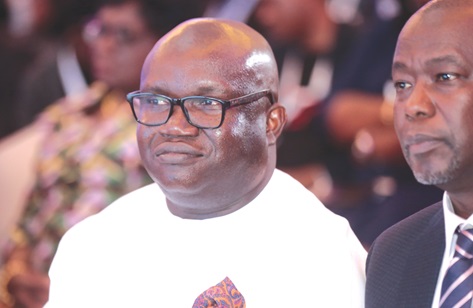
Telcos tax contribution hits GH¢6 billion
Proceeds from taxes, fees, levies and other payments remitted and gathered by the telecommunications sector for the government increased from GH¢ 4.02 billion in 2021 to GH¢ 6.07 billion last year.
The increase is over 50 per cent of the 2021 figure.
The Chief Executive Officer of the Ghana Chamber of Telecommunication (GCT), Dr Kenneth Ashigbey, made this known during the launch of the 2022 Mobile Industry Transparency Initiative report held last Tuesday at the Ghana-India Kofi Annan Centre of Excellence in ICT (AITI-KACE) in Accra.
The annual report, based on data from members of the Ghana Chamber of Telecommunications, including AT, MTN, Vodafone, ATC, Helios, Comsys, CSquared, Ericsson, and Huawei, illustrated the industry's societal and economic contributions to the country's development.
Dr Ashigbey said the industry's contribution of GH¢ 6.07 billion constituted approximately 8.02 per cent of the government's 2022 tax revenue of ¢75.71 billion as outlined in the 2022 annual report of the Ghana Revenue Authority (GRA).
Out of the GH₵ 6.07 billion, GH₵1.7 billion went to Corporate Income Tax; GH₵922.9 million went to Value Added Tax, GH₵679.4 million went to Withholding tax; GH₵482.8 million went to electronic levy; GH₵768 million went to NHIL, GETF levy and COVID-19; GH₵511.6 million went to Communications Service Tax; GH₵175.18 million went to PAYE, and GH₵560.7 million went to other remittances.
Tax burden
The report also highlighted the huge tax burden placed on telecommunications companies, a situation which had significantly affected their ability to expand and make the needed investments to grow the industry.
Dr Ashigbey said the tax burden placed on telcos would stifle growth of the industry and affect commitments to new investments in the sector.
“If we are still taxing the industry, how much will be left for investment to expand and make sure that the technology is available to everybody and also to ensure there is enough money left for infrastructure companies to expand fibre?” he questioned.
He said granting tax exemptions was critical to supporting the telecommunications industry to be able to get more people to acquire smartphones and use the Internet.
He said because telecommunications was foundational to ensure real growth and get Ghana out of the financial crisis, getting people to use mobile internet would significantly impact the country's GDP.
"The more people use smart mobile devices, the more it contributes to the growth of our GDP," he said.
Study
With over 20.38 million electronic money users and 505,012 active agents, the report indicated that the mobile financial service recorded a GH₵13.07 billion balance on the float.
A tax consultant and lecturer at the University of Ghana Law School, William Kofi Owusu Demitia, urged the chamber to conduct empirical studies on the impact of the Communications Service Tax (CST) and E-levy tax types on business operations.
He said the government should be able to come up with alternative ways of modifying the two tax types in a manner that would not reduce growth in the sector without disproportionately affecting government revenue.
He also urged the chamber to engage the government to develop industry-specific medium-term revenue to grow the industry without impacting negatively on revenue.
The report stated that Withholding Tax (WHT) continued to grow in 2022 like it did in 2021, albeit at a slower rate of 11.27 per cent.
“WHT rose from GH¢ 610.5 million in 2021 to approximately GH¢ 679.4 million in 2022. The continued rise can be attributed to escalating business costs and increased spending, impacting the overall industry value chain,” the report stated.
Proceeds from the CST also grew by 26.7 per cent from GH¢ 403.9 million in 2021 to GH¢ 511.6 million in 2022. This rise of over a GH¢ 100 million can be attributed to a significant pick-up in economic activity and the usage of telecommunication services, the report said.
The report, however, stated that, “this industry-specific tax continues to put a damper on the potential volume growth and affects the affordability of data and voice for the Ghanaian subscriber.
“We would continue to propose that the rate of CST should be reduced in the near term,” the report stated.
The report further highlighted that the levies, made up of the National Health Insurance Levy (NHIL), Ghana Education Trust Fund (GETFund) levy, and the COVID-19 levy, collectively contributed GH¢ 768 million in 2022 as compared to GH¢ 584.4 million in 2021, indicating a growth of 31.4 per cent.
It added that following the introduction of the Electronic Transfer Levy (E-Levy) in May 2022, which was a 1.5 per cent tax on the transfer amount of electronic transactions, the government managed to raise GH¢ 482.8 million out of the GH¢ 6.9 billion that was targeted.
“The reduction in the E-Levy rate has resulted in some recovery in the volumes and values.
But there is the need for further revision in this policy to align it to government's digital by default strategy and our recommendation to the Ministry of Finance is to consider reducing the levy on transfer to 0.5 per cent and introduce a 0.5 per cent levy on cash-outs, among other proposals,” the report noted.
Weak Cedi
The report also stated that import duty collections in 2022 saw a jump of 78.5 per cent when compared to collections in 2021.
It stated that the rise could be attributed to, among other things, the significant depreciation of the Ghana Cedi against its major trading partners in 2022.
“As highlighted in the previous edition of this report, there's a pressing need to focus efforts on developing and implementing local solutions that alleviate pressure on the local currency,” it stated.
It added that, “we would propose that government considers some import duties and tax waivers on some critical telecommunications equipment that are very important for the country’s development.
“This should also include components for the provision of solar energy other than the panels that are currently exempt,” it suggested.
